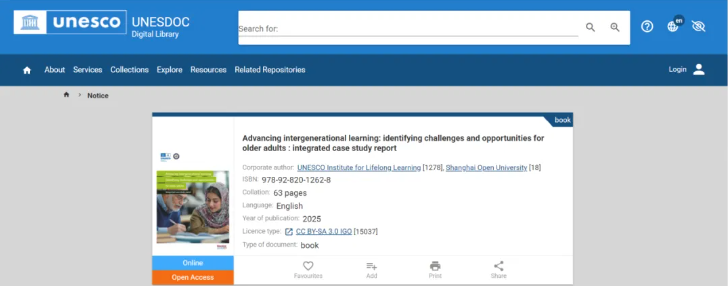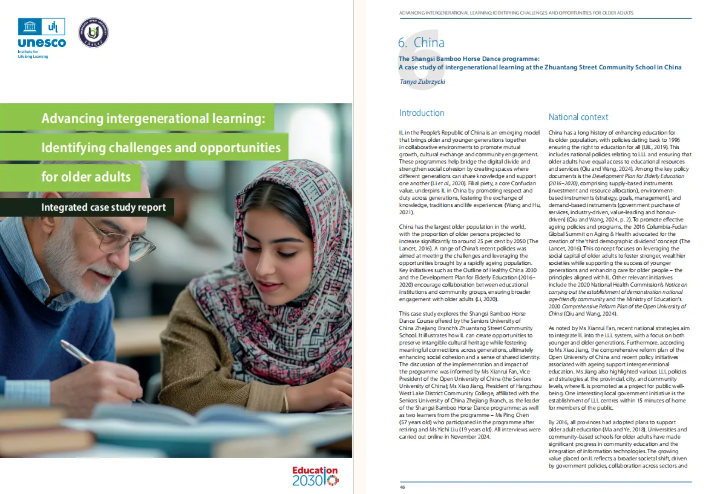 The Shangsi Bamboo Horse Dance Programme: A case study of intergenerational learning at the Zhuantang Street Community School in China, recommended and offered by Seniors University of China (SUC), has been selected in the integrated case study report Advancing Intergenerational Learning (IL*): Identifying Challenges and Opportunities for Older Adults, published by the UNESCO Institute for Lifelong Learning (UIL) and now publicly available on the UNESCO website. This programme is the only case study from Asia featured in the report.
The Shangsi Bamboo Horse Dance Programme: A case study of intergenerational learning at the Zhuantang Street Community School in China, recommended and offered by Seniors University of China (SUC), has been selected in the integrated case study report Advancing Intergenerational Learning (IL*): Identifying Challenges and Opportunities for Older Adults, published by the UNESCO Institute for Lifelong Learning (UIL) and now publicly available on the UNESCO website. This programme is the only case study from Asia featured in the report.


Using the intangible cultural heritage of the Shangsi Bamboo Horse Dance as a medium, the programme adopts a three-stage teaching model: intergenerational knowledge learning, intergenerational dance learning and intergenerational stage performance to bring older learners and younger students together to pass on traditional cultural heritage. The initiative has enhanced older adults’ social participation while fostering younger generations’ identity and appreciation of traditional culture, effectively promoting cross generational communication and cultural preservation.
In an interview with UIL experts, Ms. FAN Xianrui, Vice President of the Open University of China (OUC) and SUC, noted that the programme is a vivid example of integrating community culture with distinctive Chinese-style senior education. It embodies the concept of “seniors keep learning, youth are well taught” and offers a replicable pathway for addressing global population
UIL selected representative, innovative, and scalable intergenerational learning cases from around the world to serve as references for education policymakers, senior education institutions, and researchers. The inclusion of this case not only demonstrates SUC’s achievements in lifelong learning, but also presents a Chinese approach to intergenerational learning for the global community.
* IL in the People’s Republic of China is an emerging model that brings older and younger generations together in collaborative environments to promote mutual growth, cultural exchange and community engagement. These programmes help bridge the digital divide and strengthen social cohesion by creating spaces where different generations can share knowledge and support one another. Filial piety, a core Confucian value, underpins IL in China by promoting respect and duty across generations, fostering the exchange of knowledge, traditions and life experience.
For the full text of the case study, please visit the UNESCO website.
Source: SUC General Administration Office, College of International Education